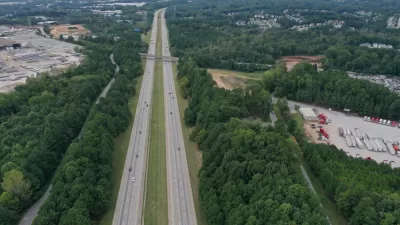A recent report from The Brookings Institution examines unemployment trends in the urban and suburban areas of the top 100 metropolitan areas in the U.S., mainly by looking at the demand for "safety net" services.
The analysis was based on changes in claims for unemployment assistance and food stamps over the past 20 months of the economic recession. The study finds that unemployment rates in urban areas is about the same as suburban areas.
"Understanding how different metropolitan areas have been affected by the recession is a critical step toward shaping appropriate regional public- and private-sector responses to promote recovery. Of course, metropolitan areas are collections of communities that may also be experiencing the downturn to varying degrees, especially now that more than half of America's metropolitan poor live in suburbia. Intra-metropolitan patterns of unemployment and need should thus additionally inform efforts to put metropolitan workers and firms on the road to recovery."
FULL STORY: The Landscape of Recession: Unemployment and Safety Net Services Across Urban and Suburban America

Planetizen Federal Action Tracker
A weekly monitor of how Trump’s orders and actions are impacting planners and planning in America.

Maui's Vacation Rental Debate Turns Ugly
Verbal attacks, misinformation campaigns and fistfights plague a high-stakes debate to convert thousands of vacation rentals into long-term housing.

San Francisco Suspends Traffic Calming Amidst Record Deaths
Citing “a challenging fiscal landscape,” the city will cease the program on the heels of 42 traffic deaths, including 24 pedestrians.

Defunct Pittsburgh Power Plant to Become Residential Tower
A decommissioned steam heat plant will be redeveloped into almost 100 affordable housing units.

Trump Prompts Restructuring of Transportation Research Board in “Unprecedented Overreach”
The TRB has eliminated more than half of its committees including those focused on climate, equity, and cities.

Amtrak Rolls Out New Orleans to Alabama “Mardi Gras” Train
The new service will operate morning and evening departures between Mobile and New Orleans.
Urban Design for Planners 1: Software Tools
This six-course series explores essential urban design concepts using open source software and equips planners with the tools they need to participate fully in the urban design process.
Planning for Universal Design
Learn the tools for implementing Universal Design in planning regulations.
Heyer Gruel & Associates PA
JM Goldson LLC
Custer County Colorado
City of Camden Redevelopment Agency
City of Astoria
Transportation Research & Education Center (TREC) at Portland State University
Jefferson Parish Government
Camden Redevelopment Agency
City of Claremont




























